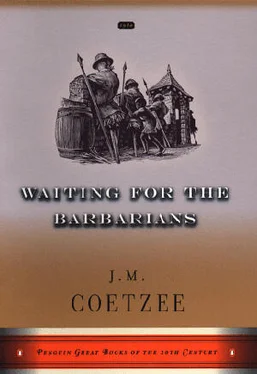
J. M. Coetzee
Waiting For The Barbarians
I HAVE NEVER SEEN anything like it: two little discs of glass suspended in front of his eyes in loops of wire. Is he blind? I could understand it if he wanted to hide blind eyes. But he is not blind. The discs are dark, they look opaque from the outside, but he can see through them. He tells me they are a new invention. "They protect one's eyes against the glare of the sun," he says. "You would find them useful out here in the desert. They save one from squinting all the time. One has fewer headaches. Look." He touches the corners of his eyes lightly. "No wrinkles." He replaces the glasses. It is true. He has the skin of a younger man. "At home everyone wears them."
We sit in the best room of the inn with a flask between us and a bowl of nuts. We do not discuss the reason for his being here. He is here under the emergency powers, that is enough. Instead we talk about hunting. He tells me about the last great drive he rode in, when thousands of deer, pigs, bears were slain, so many that a mountain of carcases had to be left to rot ("Which was a pity"). I tell him about the great flocks of geese and ducks that descend on the lake every year in their migrations and about native ways of trapping them. I suggest that I take him out fishing by night in a native boat. "That is an experience not to be missed," I say; "the fishermen carry flaming torches and beat drums over the water to drive the fish towards the nets they have laid." He nods. He tells me about a visit he paid elsewhere on the frontier where people eat certain snakes as a delicacy, and about a huge antelope he shot.
He picks his way uncertainly among the strange furniture but does not remove the dark glasses. He retires early. He is quartered here at the inn because this is the best accommodation the town provides. I have impressed it on the staff that he is an important visitor. "Colonel Joll is from the Third Bureau," I tell them. "The Third Bureau is the most important division of the Civil Guard nowadays." That is what we hear, anyhow, in gossip that reaches us long out of date from the capital. The proprietor nods, the maids duck their heads. "We must make a good impression on him."
I carry my sleeping-mat out on to the ramparts where the night breeze gives some relief from the heat. On the flat roofs of the town I can make out by moonlight the shapes of other sleepers. From under the walnut trees on the square I still hear the murmur of conversation. In the darkness a pipe glows like a firefly, wanes, glows again. Summer is wheeling slowly towards its end. The orchards groan under their burden. I have not seen the capital since I was a young man.
I awake before dawn and tiptoe past the sleeping soldiers, who are stirring and sighing, dreaming of mothers and sweethearts, down the steps. From the sky thousands of stars look down on us. Truly we are here on the roof of the world. Waking in the night, in the open, one is dazzled.
The sentry at the gate sits cross-legged, fast asleep, cradling his musket. The porter's alcove is closed, his trolley stands outside. I pass.
* *
"We do not have facilities for prisoners," I explain. "There is not much crime here and the penalty is usually a fine or compulsory labour. This hut is simply a storeroom attached to the granary, as you can see." Inside it is close and smelly. There are no windows. The two prisoners lie bound on the floor. The smell comes from them, a smell of old urine. I call the guard in: "Get these men to clean themselves, and please hurry."
I show my visitor into the cool gloom of the granary itself. "We hope for three thousand bushels from the communal land this year. We plant only once. The weather has been very kind to us." We talk about rats and ways of controlling their numbers. When we return to the hut it smells of wet ash and the prisoners are ready, kneeling in a corner. One is an old man, the other a boy. "They were taken a few days ago," I say. "There was a raid not twenty miles from here. That is unusual. Normally they keep well away from the fort. These two were picked up afterwards. They say they had nothing to do with the raid. I do not know. Perhaps they are telling the truth. If you want to speak to them I will of course help with the language."
The boy's face is puffy and bruised, one eye is swollen shut. I squat down before him and pat his cheek. "Listen, boy," I say in the p atois of the frontier, "we want to talk to you."
He gives no response.
"He is pretending," says the guard. "He understands."
"Who beat him?" I ask.
"It wasn't me," he says. "He was like that when he came."
"Who beat you?" I ask the boy.
He is not listening to me. He stares over my shoulder, not at the guard but at Colonel Joll beside him.
I turn to Joll. "He has probably never seen anything like it before." I gesture. "I mean the eyeglasses. He must think you are a blind man." But Joll does not smile back. Before prisoners, it appears, one maintains a certain front.
I squat in front of the old man. "Father, listen to me. We have brought you here because we caught you after a stock-raid. You know that is a serious matter. You know you can be punished for it."
His tongue comes out to moisten his lips. His face is grey and exhausted.
"Father, do you see this gentleman? This gentleman is visiting us from the capital. He visits all the forts along the frontier. His work is to find out the truth. That is all he does. He finds out the truth. If you do not speak to me you will have to speak to him. Do you understand?"
"Excellency," he says. His voice croaks; he clears his throat. "Excellency, we know nothing about thieving. The soldiers stopped us and tied us up. For nothing. We were on the road, coming here to see the doctor. This is my sister's boy. He has a sore that does not get better. We are not thieves. Show the Excellencies your sore."
Nimbly, with hand and teeth, the boy begins unwrapping the rags that bandage his forearm. The last rounds, caked with blood and matter, stick to his flesh, but he lifts their edge to show me the red angry rim of the sore.
"You see," the old man says, "nothing will heal it. I was bringing him to the doctor when the soldiers stopped us. That is all."
I walk back with my visitor across the square. Three women pass us, coming back from the irrigation dam with washbaskets on their heads. They eye us curiously, keeping their necks stiff. The sun beats down.
"These are the only prisoners we have taken for a long time," I say. "A coincidence: normally we would not have any barbarians at all to show you. This so-called banditry does not amount to much. They steal a few sheep or cut out a pack-animal from a train. Sometimes we raid them in return. They are mainly destitute tribespeople with tiny flocks of their own living along the river. It becomes a way of life. The old man says they were coming to see the doctor. Perhaps that is the truth. No one would have brought an old man and a sick boy along on a raiding party."
I grow conscious that I am pleading for them.
"Of course one cannot be sure. But even if they are lying, how can they be of use to you, simple people like that?"
I try to subdue my irritation at his cryptic silences, at the paltry theatrical mystery of dark shields hiding healthy eyes. He walks with his hands clasped before him like a woman.
"Nevertheless," he says, "I ought to question them. This evening, if it is convenient. I will take my assistant along. Also I will need someone to help me with the language. The guard, perhaps. Does he speak it?"
Читать дальше













